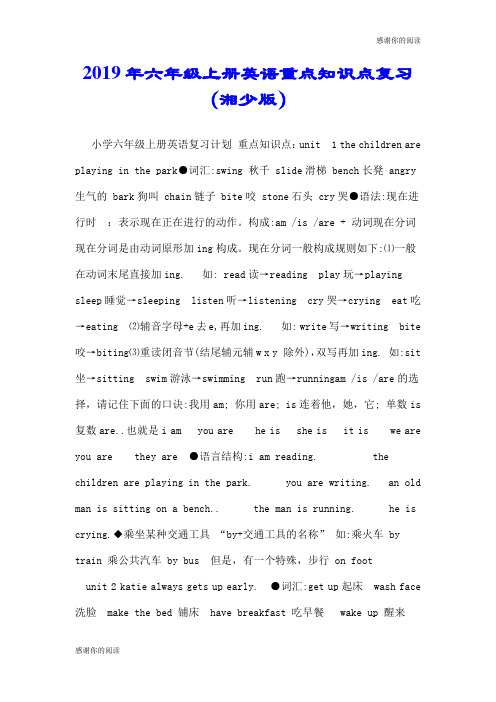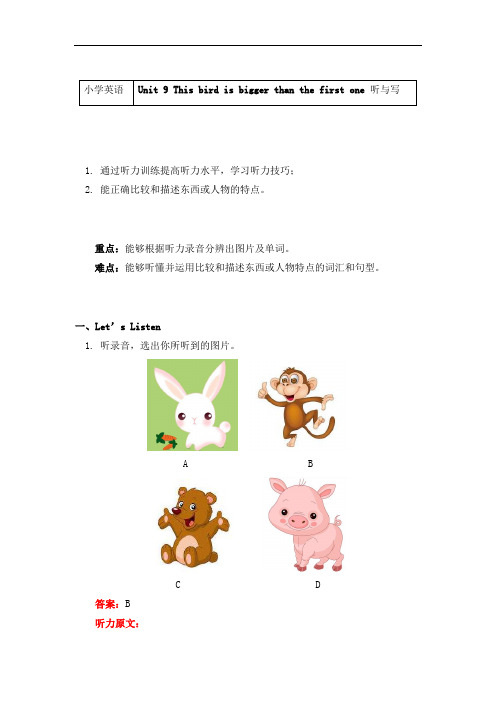【推荐】湘少版六年级英语上册:全册知识归纳
- 格式:doc
- 大小:46.00 KB
- 文档页数:6

2019年六年级上册英语重点知识点复习(湘少版)1. 语法知识1.1 时态六年级上册英语主要涉及的时态有:一般现在时、一般过去时、一般将来时和现在进行时。
时态的正确使用对于正确表达动作发生的时间至关重要。
•一般现在时:表示现在经常、反复或客观存在的动作、状态或事实。
–e.g. The sun rises in the east.•一般过去时:表示过去某个时间发生的动作或存在的状态。
–e.g. I visited my grandparents last week.•一般将来时:表示将来某个时间将会发生的动作或存在的状态。
–e.g. Tomorrow, we will go shopping together.•现在进行时:表示现在正在进行或发生的动作。
–e.g. They are playing football in the park.1.2 词汇运用六年级上册英语中学生需掌握一定数量的词汇并能够正确运用。
以下为一些重要的词汇分类:•数字:one, two, three…•颜色:red, blue, yellow…•家庭成员:father, mother, brother, sister…•动物:cat, dog, bird…•水果:apple, banana, orange…•学科:maths, English, science…•日期:Monday, Tuesday, Wednesday…•地点:school, park, home…1.3 句子结构在六年级上册英语中,学生需要了解一些基本句子结构以便正确表达意思。
以下为常见的句子结构:•主谓结构:由一个主语和一个谓语构成。
–e.g. I study English every day.•主谓宾结构:由一个主语、一个谓语和一个宾语构成。
–e.g. They eat apples for lunch.•主系表结构:由一个主语、一个系动词和一个表语构成。

湘少版六年级上册英语重点知识点复习教案.doc小学六年级上册英语复习计划重点知识点:Unit 1 The children are playing in the park●词汇:swing 秋千slide滑梯bench长凳angry生气的bark狗叫chain链子bite咬stone石头cry哭●语法:现在进行时:表示现在正在进行的动作。
构成:am /is /are + 动词现在分词现在分词是由动词原形加ing构成。
现在分词一般构成规则如下:⑴一般在动词末尾直接加ing. 如: read读→reading play玩→playing sleep睡觉→sleeping listen听→listening cry哭→crying eat吃→eating⑵辅音字母+e去e,再加ing. 如: write写→writing bite咬→biting⑶重读闭音节(结尾辅元辅w x y 除外),双写再加ing.如:sit坐→sitting swi m游泳→swimming run跑→runningam /is /are的选择,请记住下面的口诀:我用am; 你用are; is连着他,她,它; 单数is复数are..也就是I am You are He is She is It is We are You are They are●语言结构:I am reading.The children are playing in the park.You are writing.An old man is sitting on a bench..The man is running. He is crying.◆乘坐某种交通工具“by+交通工具的名称”如:乘火车by train 乘公共汽车by bus 但是,有一个特殊,步行on footUnit 2 Katie always gets up early.●词汇:get up起床wash face 洗脸make the bed 铺床have breakfast 吃早餐wake up 醒来 always 总是,一直 usually 通常 often 经常,常常never 从不,从未,从来没有 late 迟的,晚的I’m late. 我迟到了.family 家庭 wave 挥手go to school 去上学 go to bed 上床睡觉●语法:一般现在时。

湘少版六年级英语上册 Unit 12一、核心词汇★★★1.名词: Christmas 圣诞节 light灯 present礼物2.动词: decorate 装饰 receive 收到 greet 问候3.形容词: colourful 彩色的 merry 欢乐的4.短语: Santa Claus圣诞老人 dress up装扮;穿上盛装二、了解词汇★★1.名词: decoration装饰物 ham火腿 pudding布丁2.动词: roast 烤3.连词: before 在……之前4.形容词: hearty 丰盛的5.短语: give out分发;派送三、核心句型★★★1. Here's a present for you. 这是给你的礼物。
解读:此句是一个由here引起的倒装句。
举一反三: Here is your key. 这是你的钥匙。
2. People send Christmas cards to their friends to wish thema merry Christmas. 人们给朋友们寄圣诞卡片来祝福他们圣诞快乐。
解读: 此句常用来描述“给某人寄/送某物”。
举一反三: I send a present to my sister. 我送给我妹妹一个礼物。
四、了解句型★★1. Christmas falls on 25th December. 圣诞节在12月25日来临。
解读: 此句是一个一般现在时的句子。
2. They give out small presents to children. 他们给孩子发小礼物。
解读: give out意为“分发”。

2019年六年级上册英语重点知识点复习(湘少版)小学六年级上册英语复习计划重点知识点:unit 1 the children are playing in the park●词汇:swing 秋千 slide滑梯 bench长凳 angry生气的 bark狗叫 chain链子 bite咬 stone石头 cry哭●语法:现在进行时:表示现在正在进行的动作。
构成:am /is /are + 动词现在分词现在分词是由动词原形加ing构成。
现在分词一般构成规则如下:⑴一般在动词末尾直接加ing. 如: read读→reading play玩→playing sleep睡觉→sleeping listen听→listening cry哭→crying eat吃→eating ⑵辅音字母+e去e,再加ing. 如: write写→writing bite咬→biting⑶重读闭音节(结尾辅元辅w x y 除外),双写再加ing. 如:sit坐→sitting swim游泳→swimming run跑→runningam /is /are的选择,请记住下面的口诀:我用am; 你用are; is连着他,她,它; 单数is复数are..也就是i am you are he is she is it is we are you are they are ●语言结构:i am reading. the children are playing in the park. you are writing. an old man is sitting on a bench.. the man is running. he is crying.◆乘坐某种交通工具“by+交通工具的名称” 如:乘火车 bytrain 乘公共汽车 by bus 但是,有一个特殊,步行 on footunit 2 katie always gets up early. ●词汇:get up起床 wash face 洗脸 make the bed 铺床 have breakfast 吃早餐 wake up 醒来always 总是,一直 usually 通常 often 经常,常常 never 从不,从未,从来没有 late 迟的,晚的i’m late. 我迟到了. family 家庭 wave 挥手go to school 去上学 go to bed 上床睡觉●语法:一般现在时。

小学英语Unit 9 This bird is bigger than the first one 听与写1. 通过听力训练提高听力水平,学习听力技巧;2. 能正确比较和描述东西或人物的特点。
重点:能够根据听力录音分辨出图片及单词。
难点:能够听懂并运用比较和描述东西或人物特点的词汇和句型。
一、Let’s Listen1. 听录音,选出你所听到的图片。
A BC D答案:B听力原文:—Which one has the longest tail?—The monkey.2. 听录音,选择正确的答语。
A. Tom.B. Mike.C. Tom’s.D. Mike’s.答案:D听力原文:Tom and Mike are in the same class. They are both 12 years old. But Tom’s hair is shorter than Mike’s.Question: Whose hair is longer?3. 听录音,选择正确的答语。
A. The big one.B. The bigger one.C. The biggest one.D. All of them.答案:A听力原文:There are three birds in the cage. The first one is big. The second one is bigger. The third one is the biggest. But I like the first one.Question: Which bird do I like?4. 听录音,选出正确的图片。
A B C D答案:D听力原文:—Which boy do you like best?—I like the boy with the longest hair.5. 听录音,选择正确的答语。
A. Giraffes.B. Elephants.C. Rabbits.D. Monkeys.答案:B听力原文:In the 200, giraffes are the tallest animals. Elephants are the biggest animals. Rabbits are the smallest animals.Question: Which is the biggest animal in the forest?二、Let’s Write【范文欣赏】Mike, Tim and Tom are my classmates. Mike is taller than Tim. Tom is taller than Mike. So Tom is the tallest. Tim is the shortest. But Tim is the strongest. Mike’s hair is longer than Tom’s. Tim’s hair is longer than Mike’s. So Tim’s hair is the longest. They all st udy very hard.I like them very much.【写作练习】请根据图表提示,展开合理想象,编写一段小短文。

一、核心词汇★★★
1.名词: mooncake月饼centre中心type类型lotus莲花seed 种子bean 豆子
2.动词: taste尝
3.形容词: nearby 附近的
4.短语: the Mid-Autumn Festival 中秋节
二、了解词汇★★
1.形容词: bright明亮的
2.副词: even更加;甚至
三、核心句型★★★
1. I'd like a box of lotus seed mooncakes and a box of red bean mooncakes,please. 我想要一盒莲子月饼和一盒红豆月饼.
解读: 此句常用来表达自己的需要或愿望.
举一反三: I'd like some delicious mooncakes.我想要一些美味的月饼.
2. I enjoy eating mooncakes.我喜欢吃月饼.
解读: 此句常用来表达喜欢某物.
举一反三:I enjoy playing football.我喜欢踢足球.
四、了解句型★★
We saw a smaller box in it.我们看到里面有一个更小的盒子.
解读:此句是一个含有比较级的句子.
举一反三: I have a big apple. Lynn has a bigger one.我有一个大苹果.琳有一个更大的草果.。
Unit 1 What did you do during the holidays?你在假期做了什么事情?I read many books.我读了很多书。
I visited my grandparents.我拜访了我的祖父母I played games with my friends.我和我的朋友玩了游戏I learnt writing. 我学习了写作I wrote a storybook.我写了本故事书during在.....期间holiday 假日;假期learn学习practise练习speak说learn words and sentences 学习单词和句子play games玩游戏learn writing学习写作practise listening练习听Good morning 早上好Glad to see you again.再次见到你很高兴Glad to see you too.见到你我也很高兴。
Unit 2 Katie always gets up early.凯蒂总是早早起床。
Peter always gets up at7:00a.m.彼得总是上午7点起床。
always 总是;经常weekday平日often常常after在....之后wave 挥手return 返回sometimes 有时never从不wave goodbye(to her mother)(向她的母亲) 挥手告别be late for school 上学迟到do her homework 做她的家庭作业read a newspaper读报纸play chess下象棋take a walk散步return home返回家中watch TV 看电视go to bed 睡觉go to school by bus乘坐公交车上学Unit3 I like my computer.我喜欢我的电脑。
What can we do on the computers? 我们可以在电脑上做什么?We can send greetings to our friends. 我们可以给我们的朋友发送祝福。
一、核心词汇★★★
1.动词: search查找;寻找send发送;寄
2.名词: world世界greeting问侯
3.兼类词:email电子邮件;给....发电子邮件
4.短语: find out about发现;弄清(信息等)
二、了解词汇★★
1.名词: present礼物
2.形容词: wonderful极好的;精彩的
三、核心句型★★★
1. Now I can search for a lot of things about it.现在我能查阅很多关于它的事情了.
You can also find out about counties in the world.你也能查找关于世界上的国家的情况.
解读:这两句是含有情态动词can的肯定句.can意为“能够”.
举一反三:He can make kites. 他能制作风筝.
The baby can not walk. 这个婴儿不会走路.
2. It is not good for your eyes.它对你的眼睛不好.
解读: "be good for…" 意为“对……有益”.
举一反三: Sports are good for us. 运动对我们有益.
四、了解句型★★
He could do his homework on the computer,too. 他也能在电脑.上做作业.
解读: could“能,能够”,是情态动词can的过去式.
举一反三: When he was six years old,he could draw nice pictures.六岁时,他能画非常好的画.。
一、核心词汇★★★
形容词: weak弱的slow慢的
二、了解词汇★★
1.反身代词: themselves 他们自己himself 他自己
2.不定代词: another另一个
3.称呼词: Ms女士
三、核心句型★★★
1. Jane says,“I can make tea or coffee for them.”简说:“我能給他们沏茶或咖啡.”
解读: 此句使用了直接引语.直接引语就是直接引用别人的话.在英语中,直接引语一般放在引号之内.
举一反三: He asks,“What's this?”他问:“这是什么?”
2.I can ask Mum to make cakes for them.我能请妈妈給他们做蛋糕.
解读: 此句常用来表达“请求某人做某事”.
举一反三:I can ask Lucy to go with me.我可以请露西和我一起去. 3. I can sing to them and make them happy.我能給他们唱歇使他们开心.解读: 此句是含有情态动词can的肯定句,用来表达某人能做某事.举一反三: I can make kites.我会做风筝.
四、了解句型★★
I can help them to get on or off the bus. 我们帮助他们上公共汽车或下公共汽车.
解读: 此句常用来表达能帮助某人做某事.
举一反三: I can help you (to) wash the clothes.我能帮助你洗衣服.。
湘少英语六年级上册知识归纳 Unit 1 ★动词过去式变化规律: 1. 一般情况下,直接在动词词尾加ed. 如:tal—taled说 listen—listened听 play—played玩 climb—climbed爬 2. 以不发音的e结尾,在动词词尾加d. 如:practise—practised练习 3. 以辅音字母加y结尾的动词,变y为i再加ed. 如:study—studied学习,研究 4. 以一个辅音字母结尾的重读闭音节词,双写最后一个辅音字母,再加ed. 如: stop—stopped停止 5. 不规则动词没有规律,需要特殊记。如: do-did have—had go—went learn—learnt tae—too read—read spea—spoe teach—taught stand—stood sit—sat say—said run—ran is, am—was are—were write--wrote ★单词、短语 during 在…期间 holiday 假期 learn words and sentences学习单词和句子 play games玩游戏 learn writing学习写作 practice listening练习听力 ★句子 时态:一般过去时,表示过去某个时间里发生的动作或存在的状态。主要有动词的过去式体现,其标志词是过去的时间。如:yesterday昨天 last night昨晚 last wee上周 last year 去年 等等。 1. What did you do during the holidays? 假期间你做了什么? --I read many boos./ I learnt writing. / I wrote a little storyboo in English./ I visited my grandparents. Unit 2
★单词、短语 weeday工作日 after在…之后 before在..之前 always总是,经常 often时常 sometimes有时 never从不 wave goodbye挥手再见 be late for school上学迟到 read a newspaper读报纸 play chess下棋 tae a wal散步 get up起床 have/has breafast吃早餐 return home回家 ★句子 时态: 一般现在时:表示经常,反复发生的动作或存在的状态。常与always/often/sometimes/never/everday等时间状语连用。 一般人称做主语,谓语动词用原型。当主语是第三人称单数时,谓语动词要加s或es. 第三人称单数主语包括(He,she,it以及单个名称) 1. atie always gets up early. 2. She often does her homewor before dinner. 2. She sometimes plays chess with her father after dinner. 4. She never taes a wal. Unit 3
★单词、短语 world国家 email my friends给朋友发邮件 send greetings发送问候 search for a lot of things查找许多东西 find out about countries查找国家 ★句子 I lie my computer.我喜欢我的电脑。 It is very fast.它很快。 What can we do on the computer?我们能在电脑上做什么? ---We can email each other.我们可以互相发送问候。 ----We can search for a lot of things.我们可以查找许多东西。 ---We can send greetings to our friends.我们可以发送问候给朋友。 Unit 4
★单词、短语 the Mid-Autumn Festival中秋节 nearby附近的 type类型 taste尝 nuts坚果 go shopping去购物 shopping centre购物中心 have a loo看看 louts seed莲子 red bean红豆 ★句子 1. Which type do you lie? 你喜欢哪种类型?--I lie the ones with lotus seeds.我喜欢莲子馅的。 2. How much is a bo of mooncaes? 一盒月饼多少钱?--It is 50yuan. 50元。 3. This mooncae tastes good.这个月饼尝起很好吃。 4. I enjoy eating mooncaes.我喜欢吃月饼。 I enjoy looing at the moon.我喜欢赏月。 enjoy+doing喜欢做某事。 Unit 5
★单词、短语 clear 晴朗的 weather forecast天气预报 light rain小雨 heavy rain大雨 sunny and warm晴朗而又暖和 strong wind强风 sunny and cool晴朗而又凉爽 light snow小雪 ★句子 时态:一般将时,表示将某个时间将要发生的动作或存在的状态。其标志词是将的时间。 如:tomorrow明天 the day after tomorrow后天 net wee下周 net month下个月 net year明年 一般将时的句式: 肯定句:主语+will+动词原形+其他 It will be clear in Shanghai.上海将是晴朗的。 否定句:主语+will not(won’t)+动词原形+其他 It won’t rain tomorrow.明天将不会下雨。 It will be sunny and cool tomorrow.明天将是晴朗而又凉爽的。 There will be a light snow net Friday.下星期五将有小雪。 Unit 6
★学习用单位词表示名词的数量:a….of. 如:a bottle of一瓶 a bo of一盒 a few cans of几罐 a few bars of几条a piece of一张 a bowl of一碗 a cup of一杯 1.如果后接可数名词,要用可数名词的复数形式。如:a bo of caes.一盒蛋糕 a bo of candies一盒糖果 2.如果后接不可数名词,就用原形。如:a bottle of orange juice一瓶橙汁。 3.如果物品数量超过一,无论后接可数名词还是不可数名词,单位词都应该用复数形式。 如:tow cans of Coe两罐可乐 Three boes of peanuts三盒花生 a few bars of chocolate几条巧克力 ★句子 1. What are we going to bring for the picnic?我们打算带什么去野餐呢? ---I will bring a few bars of chocolate.我将带几条巧克力。 I will bring a big bottle of orange juice.我将带一大瓶橙汁。 2. I can’t wait for tomorrow to come.我等不到明天的到。 3. Let’s meet at the par at 900 a.m.让我们上午九点在公园见。 Unit7
★单词、短语 an old man一个老头 an old woman一个老奶奶 the old people老人 wea 虚弱的 slow 缓慢的 mae tea泡茶 mae caes做蛋糕 help old people on the road帮助老人过马路 clean their homes打扫他们的房间 mae them happy让他们快乐 help them to get on or off the bus帮助他们上下车 help them to carry things帮助他们拿东西 ★句子 What can I do?我能做什么? I can mae tea or coffee for them.我能给他们泡茶或咖啡。 I can help them on the road. They are wea and slow.我能帮助他们过马路。他们很虚弱而且很缓慢。 I can sing to them and mae them happy.我能唱歌给他们听并且让他们快乐。 Unit 8
★单词、短语 blouse女式短上衣 enough足够的 save节约 drop一滴 eep the rivers clean保持河流干净 eep the air clean and fresh保持空气清新 plant more trees多植树 should应该 should not=shouldn’ t不应该 should’ t ill wild animals不应该杀野生动物 should’ t waste water不应该浪费水 should’ t litter不应该乱扔垃圾 ★句子 1. We should plant more trees.我们应该多种树。 2.We should eep the air clean and fresh.我们应该保持空气清新。 3.We shouldn’t waste water.我们不应该浪费水。 4.We shouldn’t litter.我们不应该乱扔垃圾。 5.There isn’t enough water on the earth.地球上没有足够的水。 6.We must save every drop of water.我们必须节约每一滴水。 Unit 9
★语法点:掌握形容词比较级和最高级的变化规则及用法。 变化规则 1.一般情况,形容词的比较级直接在词尾加er,最高级加est. 如:small-smaller-smallest 2.形容词后面以不发音的e结尾,比较级直接加r,最高级加st. 如:nice-nicer-nicest 3.形容词后面是以辅音字母+y结尾的,变比较级要把y改为i,再加er. 如:heavy-heavier-heaviest 4.形容词后面是以一个元音字母+一个辅音字母结尾的。要双写最后的辅音字母再加er或est. 如:big-bigger-biggest 5.特殊情况,特殊记。如:good-better-best